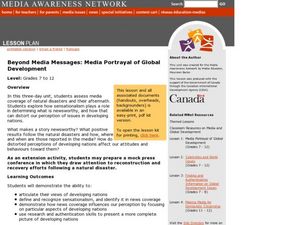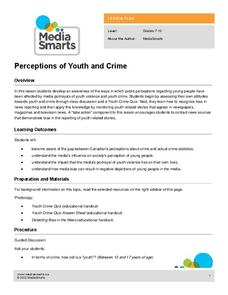Curated OER
The Campaign: Issues and Strategies. Campaign Press Coverage
Students discuss and fill out worksheets on the amount and type of press coverage given to certain candidates. In this press coverage lesson plan, students complete 4 worksheets and view maps of the United States to see where the press...
PBS
Decoding Media Bias
Alternative facts? After watching the We The Voters film, "MediOcracy," viewers compare how cable news outlets CNN, Fox News, and MSNBC report the same story about politics or public policy. After a whole-class discussion of their...
The New York Times
News and News Analysis: Navigating Fact and Opinion in the Times
Help your class understand the difference between fact and opinion by exploring the New York Times homepage and articles. In pairs or small groups, pupils complete a scavenger hunt, answering the provided questions. Next, discuss the...
Curated OER
Beyond Media Messages: Media Portrayal of Global Development
Students discuss global development and create a graphic representation of the discussion. In this media analysis lesson, students deconstruct disaster coverage by reading articles and identifying missing information. Students research...
Newseum
Compare Coverage of Brown v. Board Ruling
Young journalists analyze how The Topeka State Journal, the Jackson Daily News, and The Providence Journal reported on the 1954 Supreme Court decision in Brown v Board of Education. Scholars scrutinize the headlines, photographs,...
Facing History and Ourselves
#IfTheyGunnedMeDown
As part of their continued investigation of the reporting of the shooting of Michael Brown class members analyze photos of Michael Brown and the social media response to these images. The class then develops a guide they believe news...
PBS
What Is Newsworthy?
What is news? What is newsworthy? Who decides and what criteria do they use? Introduce young journalists to the basics of reporting with this media literacy lesson.
Newseum
Use ‘War of the Worlds’ to Teach Media Literacy
Orson Welles' 1938 radio broadcast of "War of the Worlds" is the focus of a lesson that looks at the importance of clarity in broadcasting. After listening to the radio broadcast, class members discuss the ethical obligations to...
Curated OER
Press Review
How can word choice affect a political speech? Middle and high schoolers examine the text of the 1999 State of the Union Address, and then determine how newspaper articles and television reports describe and analyze the event. Use this...
Curated OER
The Mass Media and Politics
What effect do the prevalence of televisions in homes have on the American political stage? Challenge your students to consider this idea with these ten questions, both true/false and multiple choice. You could use this activity as a...
Media Smarts
Perceptions of Youth and Crime
Explore the potential for bias in the news and in scholars' own attitudes and opinions. Begin with a quiz on youth crime to see how learners perceive crime among their peers. After looking at the correct answers, put individuals in...
Curated OER
Animals in the Media
Sure to activate young minds, this resource asks learners to consider how media influences their personal points of view. Pupils examine how animals are portrayed in the media to understand why they feel the way they do about those...
Curated OER
Easy Access: Creating Annotated Versions of News Articles
How can news coverage be made more accessible for teens? Model for your class how to use technology to annotate news stories containing unfamiliar references that hinder their interest in and understanding of a news story. Use the...
Newseum
When Tragedy Hits — Role-Playing a Breaking News Story
Young journalists engage in a role-playing exercise that asks them to consider the journalism and ethical issues raised by the coverage of the mass shootings at Virginia Tech on April 16, 2007. Pupils play the role of either a reporter...
Curated OER
Media Coverage
Students research news coverage to examine how a local issue does not receive fair attention in the news. For this new coverage lesson, students discuss where they get their information and why some issues are ignored. Students research...
iCivics
Lesson 3: Bias
How do journalists balance bias and ethical reporting? The final lesson in a series of five from iCivics examines the different types of bias and how they affect the news we read. Young reporters take to the Internet to find examples of...
Southern Poverty Law Center
Analyzing How Words Communicate Bias
Words are powerful ... can your class choose them wisely? Scholars evaluate news articles to discover the concepts of tone, charge, and bias during a media literacy instructional activity. The resource focuses on recognizing implicit...
Newseum
From the Front Page to the History Books
Young journalists compare news coverage of four major events with how the same events are covered in historical accounts. The ensuing discussion asks class members to compare and contrast the role of a reporter and the role of a historian.
Curated OER
Freedom of the Press Around the World
Learners research press freedoms in various countries such as Iran and North Korea. They create a freedom of the press report card for the countries examined.
Curated OER
Introduction to Canada
Ninth graders investigate the country of Canada by examining their media in this geography lesson. They use the Internet to research Canadian newspapers and analyze a topic covered by both US and Canadian media sources. After comparing...
American Press Institute
Creating a Classroom Newspaper
Hot off the press: a mini-unit for class members to create their own newspaper. Complete with graphic organizers, extension activities, and helpful learning targets that teach parts of a newspaper, the resource contains everything needed...
News Literacy Project
News Goggles: Newsroom Lingo Review
Learn how to talk like a journalist. Throw around jargon like "lede" and "nut graf." A 20-slide presentation introduces viewers to words and phrases heard in the fast-paced newsroom.
Curated OER
What's in the News Today?
Students examine the media and the responsibility of reporting facts to readers. In this journalism activity, students identify the different types of media, the different parts of a news story, and how the stories are relayed to the...
iCivics
Lesson 2: Misinformation
Fake news is a hot topic right now ... but what is it? Intrepid young investigators track down the facts that separate journalistic mistakes and misinformation through reading, research, and discussion. Part three in a five-instructional...

























